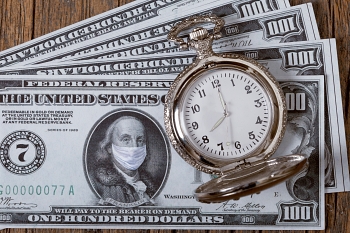
Manage Your Money During COVID-19
It's easy to panic when uncertainty is everywhere. But instead of worrying about your situation, control what you can with five tips to take charge of your money in the wake of COVID-19.
1. Leave your 401(k) alone
...and stop checking your balance.
Remember that most long-term investment plans are balanced by design to absorb the whiplash of the sell-offs and rallies that are occurring. Ignore your statements until life is back to normal.
If you contribute to your retirement with a portion from each paycheck, keep doing that – unless you absolutely need the money. You'll benefit from something called "dollar-cost averaging" – which virtually erases the impact of stock market volatility over time. It only works if you keep contributing – so don't give up on a good thing.
2. Cut back where you can
Cancel subscriptions and memberships that are no longer needed at present or see if you can place them on hold.
Delay new purchases or major projects that you're not already locked into. Depending on how swift the "bounce-back" is, there may be bargains on major buys such as cars, appliances and home improvements in the near term. Hold off a little until we understand the outlook.
Tune up your budgeting skills and apply the 50-30-20 rule to your normal income/expense sheet. Spend 50% on necessities like rent/mortgage, food, utilities and insurance, 30% on discretionary expenses you could live without, and set aside the remaining 20% in savings.
3. Save more
If you are still employed, trim down your budget and build up an emergency savings account for the months ahead. Don't touch it for anything else. You're aiming for an amount equal to at least 3-6 months' normal income.
If you can, tuck your stimulus check or tax refund immediately into emergency savings. If you're barely staying afloat, keep reading.
4. Pay down bills and debt the right way
Prioritize those bills which you absolutely must pay on time but don't assume it's business as usual Numerous coronavirus relief programs are now in place to delay or defray expenses like electricity bills, student loans, car loans, and many states have established no-eviction orders for the short term. But remember: you'll have to pay those bills eventually.
Contact your lenders and landlord now – before you miss a payment. Explain exactly what is going on for you financially. Ask them what they can offer and be honest about what you can realistically do to pay down your balance now and for the next few months. Lenders understand this is a difficult time for everyone.
If you are receiving letters, calls or emails from creditors, do not ignore them. It will only make resolving your account more difficult.
5. Ask for help
Numerous federal programs for those affected by COVID-19 a have been set in motion including Economic Impact Payments to taxpayers. States are expanding unemployment benefits and implementing local relief plans. All are designed to steady your financial ship until the worst is past.
In addition, consider a debt relief plan to help negotiate and modify terms, minimum payments and strategies to relieve the stress and clarify a path forward. (There is a path forward.)
Use whatever assistance there is to help you establish the financial foundation for yourself and those you love.
Amid the Coronavirus Crisis, the future seems hard to anticipate but worrying about money only fuels indecision and stress. By taking a few steps now and sticking to a simple plan, you'll feel financially stronger and ready for whatever comes next. We're here to help.
